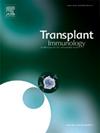Hsp90 and HIF-1α regulate mitophagy by promoting BNIP3 expression in renal ischemia-reperfusion injury
IF 1.6
4区 医学
Q4 IMMUNOLOGY
引用次数: 0
Abstract
Background
Ischemia-reperfusion injury (IRI) is a major cause of acute kidney injury (AKI). Studies have shown that mitochondrial damage is involved in the pathogenesis of AKI, and that inhibition of Hsp90 expression can improve IR-induced AKI. However, the mechanisms by which Hsp90 improves IR-induced AKI and whether it is involved in mitochondrial autophagy remain unclear.
Methods
An IR-induced AKI mouse model was established, and the degree of renal injury was analyzed using hematoxylin and eosin (H&E) and periodic acid-Schiff (PAS) staining. The expression of Hsp90, HIF-1α, BNIP3, and mitochondrial autophagy proteins was detected by western blotting in vivo and in vitro. HK2 cell viability, apoptosis, mitochondrial autophagy, reactive oxygen species (ROS), and inflammatory cytokines levels were detected using Cell Counting Kit 8 (CCK8) assays, Terminal·deoxynucleotidyl transferase-mediated dUTP nick end·labeling (TUNEL) labeling, immunofluorescence, and enzyme-linked immunosorbent (ELISA).
Results
A murine IR-induced AKI model was successfully generated, and increased expression levels of Hsp90, HIF-1α, and inflammatory cytokines were observed, accompanied by a worsening of renal injury. After induction of IRI in HK2 cells, downregulation of Hsp90 or HIF-1α expression resulted in decreased downstream BNIP3 expression, an increase in HK2 cell viability, and a decrease in the level of mitochondrial autophagy.
Conclusion
Hsp90 upregulated the expression of HIF-1αand BNIP3, thereby enhancing mitochondrial autophagy in IR-induced AKI.
Hsp90和HIF-1α通过促进肾缺血再灌注损伤中BNIP3的表达调节线粒体自噬。
背景:缺血再灌注损伤(IRI)是急性肾损伤(AKI)的主要原因。研究表明,线粒体损伤参与AKI的发病机制,抑制Hsp90表达可改善ir诱导的AKI。然而,Hsp90改善ir诱导AKI的机制及其是否参与线粒体自噬尚不清楚。方法:建立ir诱导的AKI小鼠模型,采用苏木精-伊红(H&E)染色和周期性酸-希夫(PAS)染色对小鼠肾损伤程度进行分析。western blotting法检测小鼠体内和体外Hsp90、HIF-1α、BNIP3和线粒体自噬蛋白的表达。采用细胞计数试剂盒8 (CCK8)、末端·脱氧核苷酸转移酶介导的dUTP缺口末端标记(TUNEL)、免疫荧光和酶联免疫吸附(ELISA)检测HK2细胞活力、凋亡、线粒体自噬、活性氧(ROS)和炎症细胞因子水平。结果:成功建立了ir诱导的小鼠AKI模型,观察到Hsp90、HIF-1α和炎症因子表达水平升高,并伴有肾损伤加重。诱导HK2细胞IRI后,下调Hsp90或HIF-1α表达,导致下游BNIP3表达降低,HK2细胞活力增加,线粒体自噬水平降低。结论:Hsp90上调hif -1α和BNIP3的表达,从而增强ir诱导AKI的线粒体自噬。
本文章由计算机程序翻译,如有差异,请以英文原文为准。
求助全文
约1分钟内获得全文
求助全文
来源期刊

Transplant immunology
医学-免疫学
CiteScore
2.10
自引率
13.30%
发文量
198
审稿时长
48 days
期刊介绍:
Transplant Immunology will publish up-to-date information on all aspects of the broad field it encompasses. The journal will be directed at (basic) scientists, tissue typers, transplant physicians and surgeons, and research and data on all immunological aspects of organ-, tissue- and (haematopoietic) stem cell transplantation are of potential interest to the readers of Transplant Immunology. Original papers, Review articles and Hypotheses will be considered for publication and submitted manuscripts will be rapidly peer-reviewed and published. They will be judged on the basis of scientific merit, originality, timeliness and quality.
文献相关原料
公司名称
产品信息
索莱宝
Schiff's reagent
 求助内容:
求助内容: 应助结果提醒方式:
应助结果提醒方式:


